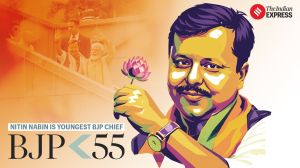A friend in deed
In showering praise on US President George W. Bush for his personal commitment to implement the civil nuclear initiative...

In showering praise on US President George W. Bush for his personal commitment to implement the civil nuclear initiative, Prime Minister Manmohan Singh has drawn predictable flak from his opponents at home. Dr Singh8217;s warm farewell to Bush at White House last Thursday should, however, mark the beginning of a new trend in India8217;s diplomatic culture 8212; of owning the nation8217;s friends in public. It adds to India8217;s reputation as a rising power that it can acknowledge its friends and keep them. Unlike our leaders on the left and right, blindsided by either ideology or opportunism, urban India has consistently given Bush one of the highest ratings in the world over the last few years. This, in turn, was rooted in Bush8217;s single-handed reversal of the entrenched US hostility towards India on Kashmir and non-proliferation.
Whether it was in preventing Washington8217;s nuclear ayatollahs from wrecking the deal over the last three and a half years, or the raw exercise of American power to clear the deal through the 45-nation
Nuclear Suppliers Group earlier this month, Bush was ready to spend any amount of political capital to build a new partnership with India. Over the last couple of weeks, despite an unprecedented financial crisis that has consumed Washington, Bush pressed a reluctant American Congress to approve the 123 agreement on short order. The scale of the opposition was evident in
Saturday8217;s vote in the House of
Representatives. The fast track, amendment-free procedure demanded that the India bill get a two thirds majority, 290, in a house of 435. The bill scraped through with 298 votes. Without White House8217;s steam roller, the opponents of the deal 8212; 107 Democrats voted against it 8212; could have killed it with simple legislative manoeuvre. Within hours of the House vote, Bush began to demand that the US Senate approve the India bill before it adjourns this week and consummate the nuclear deal.
As he brings to a close India8217;s recent nuclear initiative, the boldest diplomatic foray since the 1971 war to liberate Bangladesh, the PM has also begun a new conversation with Bush on South Asia. For decades,
India and the US were on the opposing sides of the Great Game on India8217;s north-western borders. Thanks to Bush, India and the United States can now consider unprecedented political cooperation to stabilise Pakistan and Afghanistan. That no one had bet on this remarkable strategic turn may be the most definitive testimony to Bush8217;s historic contribution to the transformation of Indo-US relations.
- 01
- 02
- 03
- 04
- 05









![Kokrajhar [Assam], Jan 20 (ANI): Police deployed during a protest between two groups at National Highway, in Kokrajhar on Tuesday. (ANI Video Grab)](https://images.indianexpress.com/2026/01/kokrajhar.jpg?w=300)





















